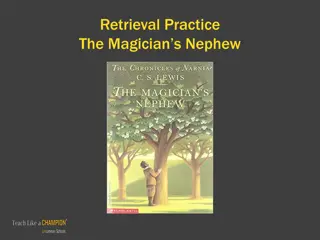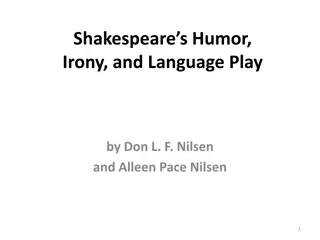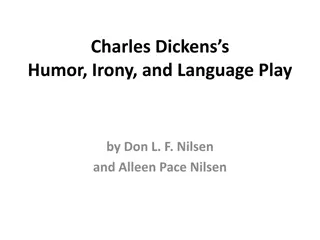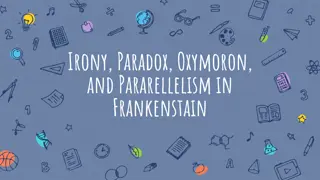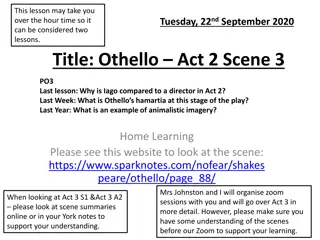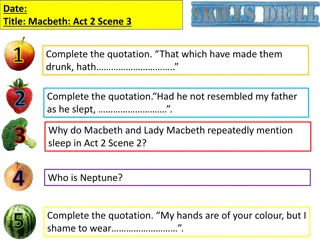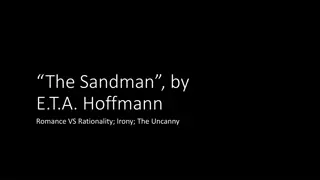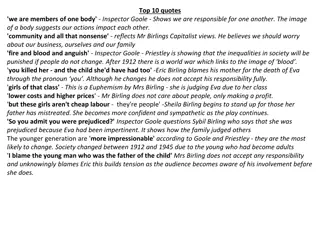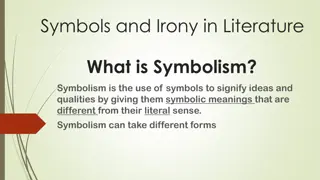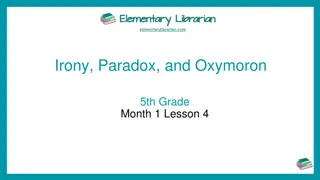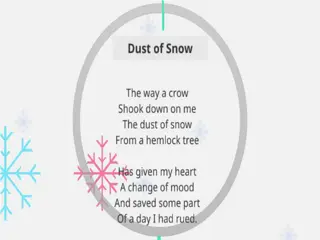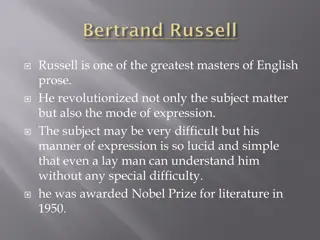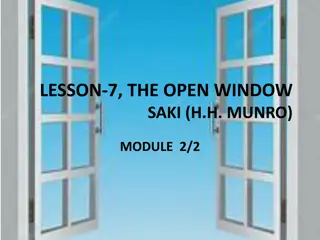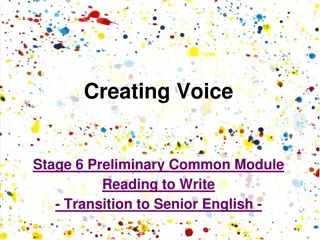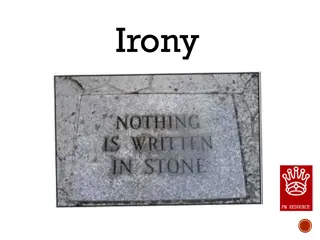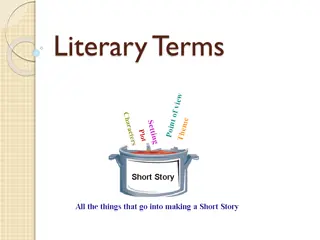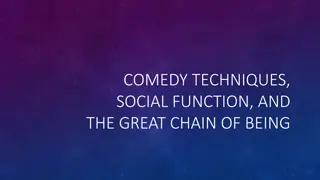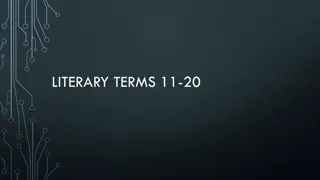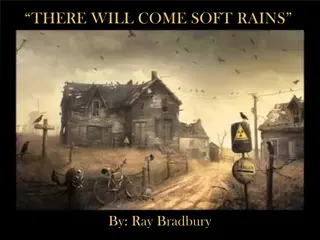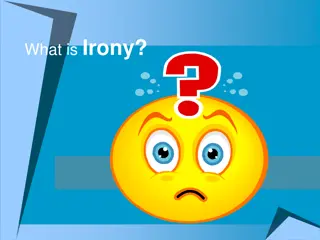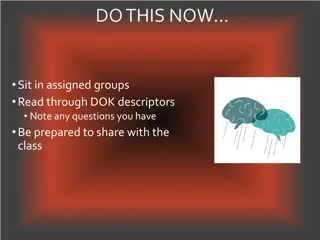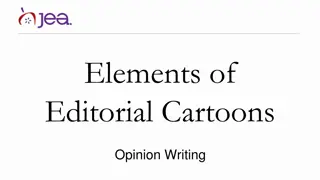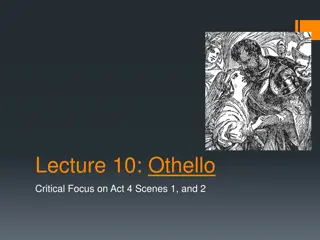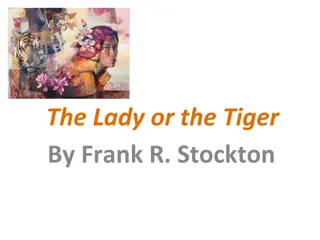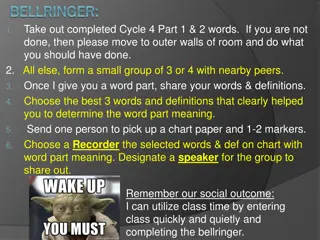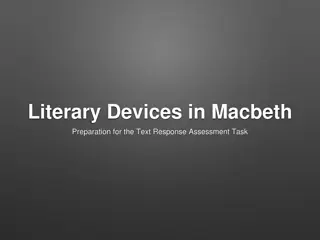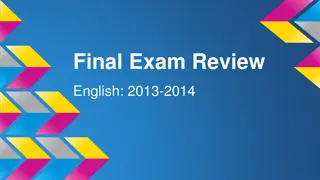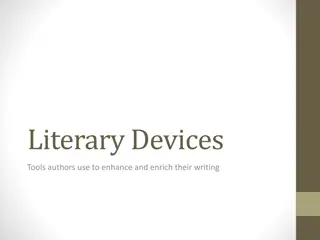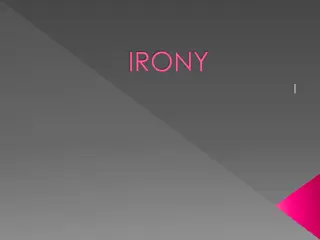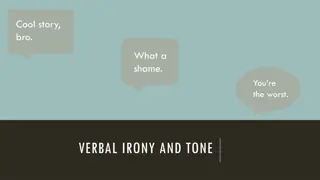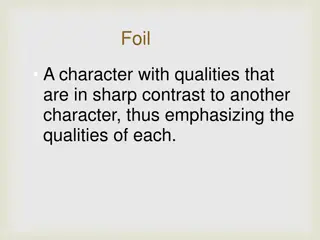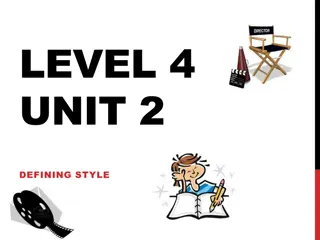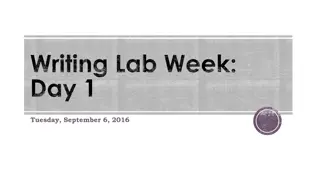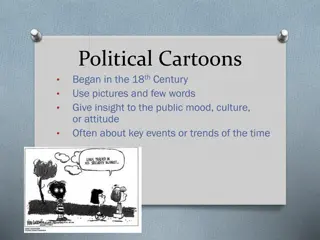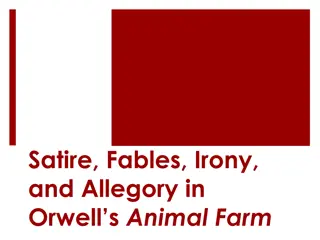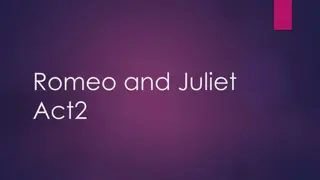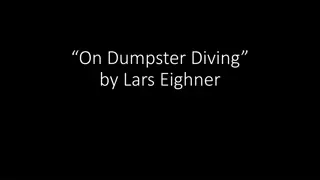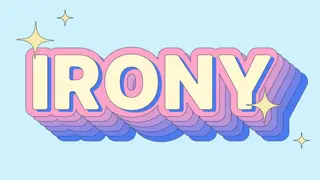Analysis of Fantasy Elements in "The Magician's Nephew" & Victorian Gender Roles
Explore the fantasy genre in "The Magician's Nephew" with a focus on elements like intrusive narration, allusions, and suspense. Delve into how C.S. Lewis's life influenced the novel. Discover Victorian gender roles through concepts like separate spheres and class distinctions. Unveil literary terms
0 views • 13 slides
Exploring Humor, Irony, and Language Play in Shakespeare's Works
Delve into the world of Shakespeare's comedies, romances, histories, and tragedies to uncover the nuances of humor, irony, and language play. From the eccentric characters in his comedies to the witty wordplay in his tragedies, Shakespeare's works offer a rich tapestry of literary devices that enter
0 views • 43 slides
Understanding Charles Dickens: Humor, Irony, and Language Play
Explore the world of Charles Dickens through his unique humor, irony, and language play. Delve into his novels categorized as Comedies of Manners and Comedies of Humours, with a focus on the diverse characters he created. Discover how Dickens skillfully evokes strong emotions to tackle serious theme
6 views • 27 slides
Irony, Paradox, Oxymoron, and Parallelism in Frankenstein
Exploring the concepts of irony, paradox, oxymoron, and parallelism in Mary Shelley's "Frankenstein." The discussion covers different types of irony such as situational, verbal, and dramatic, highlighting instances from the novel. Additionally, the concept of paradox is examined, showcasing statemen
0 views • 16 slides
Analyzing Iago's Manipulation in Othello Act 2 Scene 3
Explore the intricate dynamics between Iago and Cassio in Act 2 Scene 3 of Othello. Dive into the themes of manipulation, loyalty, and deception as Iago orchestrates his plans while examining Cassio's susceptibility to Iago's ploys. Uncover the layers of dramatic irony, thematic contrasts, and chara
0 views • 8 slides
Discovering the Porter in Macbeth's Act 2 Scene 3
Act 2 Scene 3 of Macbeth features the Porter's comedic interlude, providing relief from the tense atmosphere following Duncan's murder. The Porter's dialogue, filled with humorous references and wordplay, adds a layer of complexity to the play's themes. This scene contributes to building suspense an
2 views • 9 slides
Exploring E.T.A. Hoffmann's "The Sandman": A Study in Romanticism, Irony, and the Uncanny
Delve into the world of E.T.A. Hoffmann's literary masterpiece "The Sandman," where themes of Romanticism versus rationality, irony, and the uncanny intertwine. Through the characters of Nathaniel and Clara, the story explores the tensions between passion and reason, imagination and reality. Dive de
0 views • 12 slides
Insights into "An Inspector Calls": Themes and Contexts
A detailed exploration of key quotes and themes from "An Inspector Calls" by J.B. Priestley, such as responsibility, class divides, and societal change. The analysis delves into characters' perspectives, societal norms of the Edwardian era, and the impact of significant events like World War I. The
0 views • 5 slides
Understanding Symbolism and Irony in Literature
Symbolism in literature involves using symbols to convey deeper meanings beyond the literal sense, adding layers of interpretation for readers. Common symbols like doves, red roses, and sunrises represent peace, love, and new beginnings, respectively. Irony, on the other hand, includes situational,
0 views • 6 slides
Understanding Irony, Paradox, and Oxymoron in Figure of Speech
Exploring the concepts of irony, paradox, and oxymoron through examples and exercises in a lesson designed for 5th-grade students. Students learn to identify these figures of speech that show contrast and contradiction, enhancing their understanding of language and expression. The lesson provides ex
1 views • 8 slides
Analysis of Robert Frost's Poem and Literary Devices Used
The short poem by Robert Frost delves into the profound healing power of nature and tiny entities. It highlights how nature can cure anything from a bad mood to ill-health. The poet's encounter with a crow near a hemlock tree, where snow was dusted upon him, instantly changes his mood, making his da
0 views • 12 slides
Exploring the Mastery of English Prose: The Style of Bertrand Russell
Bertrand Russell, a Nobel Prize-winning writer, revolutionized English prose with his lucid and simple expressions on complex subjects. Known for his use of long sentences, terseness, allusiveness, and irony, Russell's style combines clarity with deep meanings and continuity of thought. His allusion
0 views • 11 slides
Summary and Irony in "The Open Window" by Saki
Framton Nuttel, seeking peace in the countryside, encounters a series of unsettling events at his friend's home. The niece spins a tale about the open window, leading to a chilling twist that heightens Framton's anxiety. Irony weaves throughout the narrative as the supposedly tranquil setting exacer
0 views • 8 slides
Discovering Literary Techniques for Creating Voice in Writing
Explore various literary techniques such as nouns, adjectives, adverbs, verbs, pronouns, dialogue, repetition, punctuation, imagery, irony, and setting to enhance voice in writing. Delve into how these elements shape characters, set moods, and convey meanings, offering insight into crafting compelli
0 views • 8 slides
Understanding Irony in Verbal, Dramatic, and Situational Contexts
Explore the nuances of verbal, dramatic, and situational irony through examples and explanations. Verbal irony involves saying something different from what is meant, often using humor like puns. Dramatic irony occurs when the audience knows something the characters don't, creating suspense. Situati
0 views • 12 slides
Understanding Literary Terms and Characterization in Fiction
Explore essential literary terms such as setting, tone, mood, protagonist, antagonist, irony (verbal, situational, dramatic), characterization (direct and indirect), and types of characters (static, dynamic, flat, round). Enhance your comprehension of how authors craft stories with diverse character
0 views • 18 slides
Comedy Techniques, Social Function, and The Great Chain of Being
Explore the world of comedy, from slapstick and farce to parody and satire. Learn about techniques like dramatic irony and gallows humor that add depth to comedic genres. Discover how the Great Chain of Being shaped Elizabethan beliefs about social order and divine right. From God and angels to tree
0 views • 6 slides
Understanding Literary Devices: Allusion, Foil, Hyperbole, Idiom, Irony, Metaphor
Explore key literary terms including allusion, foil, hyperbole, idiom, irony, and metaphor. Learn how these devices enhance storytelling by creating depth, contrast, exaggeration, cultural nuances, and symbolic meaning within literature.
1 views • 14 slides
Literary Elements Explained: Setting, Protagonist, Antagonist, Irony, Symbolism, Theme
Exploring various literary elements such as setting, protagonist, antagonist, irony, symbolism, and theme using examples from works like "There Will Come Soft Rains" by Ray Bradbury. Dive into the depth of each element and understand their significance in storytelling.
4 views • 17 slides
Exploring the Depths of Irony in Literature
Irony in literature serves as a powerful tool for authors to convey messages in unexpected ways. This content delves into the various types of irony - verbal, situational, and dramatic - providing examples and insights into how each type functions to engage readers and add depth to storytelling. Thr
1 views • 14 slides
Understanding Civil Disobedience Through Thoreau's Perspective
Explore Henry David Thoreau's views on civil disobedience by delving into key passages from his writing, dissecting his ideas on government authority, the basis of a free society, and the irony he points out about his night in jail. Engage in group discussions, analyze DOK levels of questions, and u
1 views • 21 slides
Exploring the Elements of Editorial Cartoons in Opinion Writing
Discover the significance of editorial cartoons in conveying opinions through visual storytelling. Uncover why editorial cartoons are effective, whether they need to be humorous, and the key elements such as analogy, irony, symbolism, and labels. Dive into examples illustrating how these elements ar
0 views • 9 slides
Analysis of Othello's Downfall in Act 4 Scenes 1 and 2
In Act 4 Scene 1 of Othello, Iago manipulates Othello into believing in Desdemona's infidelity, intensifying Othello's jealousy and rage. The scene culminates in Othello publicly striking Desdemona, showcasing the depths of his descent into corruption. Meanwhile, Act 4 Scene 2 portrays Othello's com
1 views • 49 slides
Understanding Irony in Frank R. Stockton's Stories
Explore the concept of irony in the works of Frank R. Stockton, focusing on "The Lady or the Tiger" and "The Most Dangerous Game." Discover examples of verbal and situational irony in these stories, analyzing how the unexpected twists add depth to the narratives and engage readers.
1 views • 33 slides
Understanding Irony: Types, Examples, and Analysis in Literature
Explore the concept of irony in literature through definitions, types, examples, and analysis. Learn how authors use irony to create depth and meaning in their works. Discover different forms of irony such as verbal, situational, and dramatic, along with examples to enhance understanding. Delve into
0 views • 9 slides
Analysis of "The Kite Runner" Chapters 8-11: Loyalty, Irony, and Motifs
In Chapters 8-11 of "The Kite Runner," key events include Amir lying, betraying his friend Hassan, and the family fleeing Afghanistan. The analysis discusses themes of loyalty, irony, and motifs like blood and pomegranates, highlighting the complex relationships and character dynamics in the novel.
0 views • 8 slides
Literary Devices in Macbeth: Text Response Assessment Preparation
Exploring literary devices in Macbeth reveals the use of aside for character insights, imagery to evoke sensations, verbal irony for hidden meanings, dramatic irony for contrasts, and metaphors for rich associations. These elements deepen the understanding of characters and themes in Shakespeare's p
1 views • 13 slides
Examining Literary Devices in Romeo and Juliet
This review explores key literary devices such as dramatic irony, situational irony, verbal irony, iambic pentameter, simile, metaphor, personification, imagery, and soliloquy in Shakespeare's Romeo and Juliet. Examples from the play illustrate how these devices enhance storytelling and character de
0 views • 17 slides
Exploring Key Literary Devices in Writing
Literary devices such as foreshadowing, suspense, irony, symbolism, and tone are essential tools that authors use to enhance their writing. Foreshadowing hints at future events, suspense keeps readers engaged, irony adds depth, symbolism conveys deeper meanings, and tone sets the author's attitude.
1 views • 16 slides
Understanding Irony: Verbal, Dramatic, and Situational Examples
Dive into the world of irony with examples of verbal, dramatic, and situational irony explained through scenarios like sarcastic comments, horror movie twists, and unexpected encounters. Explore how irony adds layers of meaning and depth to storytelling, from characters knowing more than others to o
0 views • 10 slides
Understanding Verbal Irony and Tone Through Examples
Verbal irony is the expression of words conveying the opposite of their literal meaning. It is not the same as lying and is used to emphasize a point. Tone plays a crucial role in conveying irony, as it can affect how the message is perceived. Sarcasm, though related, has a negative agenda of mockin
0 views • 7 slides
Analyzing Suspense Techniques in Roald Dahl's "Lamb to the Slaughter
Analyze how Roald Dahl effectively creates suspense in "Lamb to the Slaughter." Explore elements such as suspense, irony, and verbal irony that contribute to the intense feeling experienced by the audience while waiting for the outcome of events within the story.
0 views • 18 slides
Explore Literary Devices in Drama
Delve into the world of drama with an examination of various literary devices such as foils, foreshadowing, similes, metaphors, conflicts, protagonists, antagonists, soliloquies, monologues, asides, irony, dramatic irony, blank verse, iambic pentameter, alliteration, and puns.
0 views • 13 slides
Exploring Irony in Literature: Analysis and Applications
Dive into the concept of irony in literature through classic short stories and examples from renowned authors like O. Henry and Heker. This content dissects situational, verbal, and dramatic irony, guiding readers to identify and appreciate various forms of irony in storytelling. Analyze excerpts fr
0 views • 15 slides
Analysis of Irony and Paradox in Narayan and Saki's Stories
Explore the use of irony and paradox in the works of R.K. Narayan and Saki to highlight the themes of truth, deception, and honesty. Compare and contrast how the authors present these concepts, providing evidence from the texts to support your analysis. Identify examples of dramatic, situational, an
0 views • 35 slides
Understanding Political Cartoons: Symbols, Metaphors, and Irony
Political cartoons are historical snapshots that use visual symbols, metaphors, and irony to reflect public sentiments and critique current events. Through visual distortion, stereotypes, and caricature, these cartoons offer insights into culture and attitudes, aiming to provoke thoughtful discourse
0 views • 18 slides
Understanding Satire, Fables, Irony, and Allegory in Orwell's Animal Farm
Satire, fables, irony, and allegory play crucial roles in literature like Orwell's Animal Farm. Satire ridicules societal vices, fables convey morals through stories, irony provides contradiction, and allegory deepens meanings. Through examples and explanations, these literary devices are explored a
0 views • 16 slides
Analysis of Literary Devices in Romeo and Juliet Act 2
In Act 2 of Romeo and Juliet, the characters use various literary devices such as allusion, dramatic irony, hyperbole, and foreshadowing. Mercutio mistakenly believes Romeo is still in love with Rosaline, showcasing dramatic irony. Additionally, Friar Lawrence's words foreshadow the danger in Romeo
0 views • 10 slides
Analyzing "On Dumpster Diving" by Lars Eighner
This analysis explores the rhetorical strategies, language usage, and irony in Lars Eighner's essay "On Dumpster Diving," focusing on allusions to Kerouac and Steinbeck, the appeal to ethos, logos, and pathos, and the distinction between scavengers and scroungers. It delves into the effects of scien
0 views • 6 slides
Understanding Irony: Types, Purpose, and Examples
Irony is about expectations and contrast between reality and what is being said. It can add interest, depth, suspense, and humor to texts. The three types of irony are verbal, dramatic, and situational, each serving a unique purpose to engage the audience. Examples from popular stories like Beauty a
0 views • 12 slides
